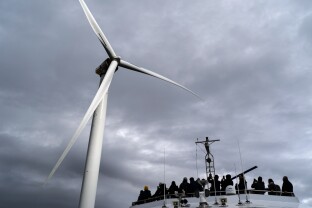The Interior Department is officially ending a large wind project that was set to be built in south-central Idaho, Secretary Doug Burgum announced Wednesday.
Burgum rescinded approvals on Wednesday for the Lava Ridge Wind Project, which was greenlit under former President Joe Biden’s administration in 2024 and was set to generate more than 1,000 megawatts of energy and power up to 500,000 homes in the region. The project would have been one of the largest wind farms in the United States.
The reversal came after President Donald Trump signed an executive order on his first day halting any movement on the project and calling on the Interior Department to conduct a review. The order mainly targeted offshore wind development, and Lava Ridge was the only onshore facility specifically mentioned.
According to Magic Valley Energy, the developer for Lava Ridge, the project was in its final design stages and was set to begin construction in 2027. The Biden-era Bureau of Land Management said the project could create more than 700 jobs and generate more than $130 million in revenue for local economies.
The cancellation paves a clear path for an alternative use of the public lands originally slated to hold more than 200 wind turbines. An Idaho-based nuclear energy developer is already eyeing the land for a nuclear plant and has filed early-stage proposals, Utility Dive reported last month. The Trump administration has pushed for faster movement on nuclear energy development.
Republican lawmakers — who cheered the January Trump executive order that halted Lava Ridge’s development after years of advocating for the project’s cancellation — were enthusiastic about Burgum’s announcement.
Idaho Sen. Jim Risch called Lava Ridge a “disastrous project” and said he “worked hand in hand” with Trump to ensure its end.
“Idahoans have spoken loud and clear over the last few years: the Lava Ridge Wind Project has no place in our state,” Rep. Mike Simpson said in a statement. “Today’s decision confirms that common sense and the will of the people prevailed.”
Simpson also said in an interview with Idaho station KTVB that the Congress’ interior and environment appropriations bill, which passed out of House and Senate committees last month, includes language that effectively kills the Lava Ridge project by directing that federal funds cannot be used for construction.
“I’m not against wind power,” Simpson told KTVB. “I thought it was inappropriate where they were putting it, and so did the people of the Magic Valley.”
The project raised concerns from environmental groups and cultural and historic groups because of its proximity to the Minidoka National Historic Site, which commemorates the site of an internment camp for Japanese Americans during World War II, and to tribal land.
In response to concerns about the project’s impact on the state’s Native American and Japanese American communities, the Biden-era Bureau of Land Management significantly scaled down the original scope of the project when it provided final approval for the development to move forward, limiting development on 15,000 acres included in Magic Valley Energy’s original proposal.
Idaho Republican Rep. Russ Fulcher said in a statement that he supports the Trump administration’s decision to end “costly, unreliable energy projects that make the U.S. dependent on our top foreign adversary—Communist China.”
The cancellation of Lava Ridge is part of a larger crackdown by the Trump administration on wind and other types of clean energy. In addition to the January executive order halting all offshore wind leasing, the administration has also attempted to stop wind projects that are already in progress, restrict developers’ eligibility for tax credits as part of a deal with conservative lawmakers and create a more intensive review process for clean energy development on federal lands.
But some moderate Republicans have spoken out in support of clean energy, saying it is a way to bolster rising American energy demands and prices.
In Idaho, the project faced vocal opposition from state lawmakers in both parties, as well as some support from local conservation groups that claimed Lava Ridge would drive down utility bills and create a more resilient grid.
Sign in
Log into your free account with your email. Don’t have one?
Check your email for a one-time code.
We sent a 4-digit code to . Enter the pin to confirm your account.
New code will be available in 1:00
Let’s try this again.
We encountered an error with the passcode sent to . Please reenter your email.


